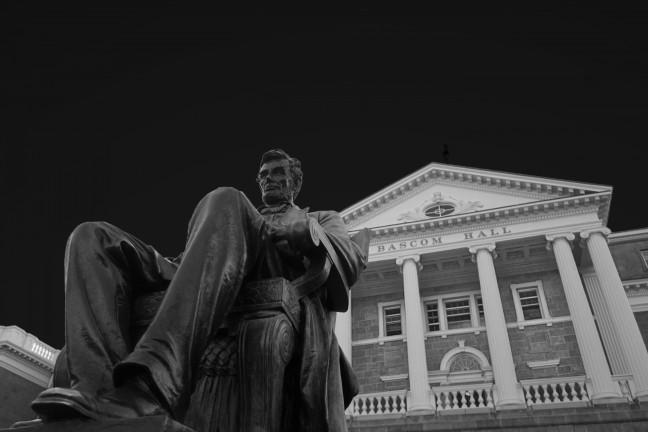The University of Wisconsin released its first campus climate report Wednesday, in which it detailed the results of a survey examining the social atmosphere at the university and posited recommendations to improve the campus climate based on these results.
The survey, which was conducted last year, was taken by 21 percent, or 8,652, students. According to the report, the demographics of the survey respondents are reflective of the overall UW student population.
According to survey results, most students reported a positive campus climate. But, students of minority populations reported a less positive campus climate than the overall response, especially when compared to majority students.
Chancellor Rebecca Blank said all students must feel welcome, safe and respected on campus, and anything less is simply “unacceptable.”
“The results confirm what we’ve long heard anecdotally: there are real disparities in how students of different backgrounds and identities experience campus here at UW,” Blank said.
While 81 percent of overall students reported feeling welcome on campus, this was true for only 69 percent of LGBQ students, 67 percent of disabled students, 65 percent of students of color and 50 percent of trans/non-binary students.
Dejope sacred fire circle vandalized in ‘intentional, despicable act’
Additionally, while 69 percent of all students responded feeling like they belong on campus, the same was true for only 56 percent of disabled students, 51 percent of LGBQ students, 50 percent of students of color and 35 percent of trans/non-binary students.
In another survey question, 11 percent of overall students reported experiencing hostile, harassing or intimidating behavior. These percentages increase for many of the same groups who reported feeling less welcome or less like they belong on campus.
At 33 percent, trans/non-binary students were most likely to experience hostile, harassing or intimidating behavior. Also falling above the aggregate response of 11 percent, 28 percent of disabled students, 21 percent of LGBQ students, 19 percent of students of color and 14 percent of women reported experiencing this type of behavior.
Additional findings from the survey reported minority students as more likely to seriously consider leaving UW, less likely to find others to socialize or study with, more likely to spend time with students different from them and less comfortable contacting a UWPD officer.
Additionally, a quarter of students felt the need to represent their identity in class, which the report said is “an experience that was described as negative by most Students of Color, trans/non-binary students, LGBQ students, and students with a disability.”
While UW said it is aware students of color experience a less positive campus climate, the school also cited similar reported experiences by students of color at other institutions. The survey’s recommendations are offered in light of concerns expressed on both local and national levels.
“Other universities — Minnesota, UC-Berkeley, University of Illinois system — have also done surveys like this. And while the results weren’t directly comparable because the surveys weren’t identical, the findings were broadly similar,” Blank said.
At the institutional level, the report found 75 percent of student survey respondents said it is important to them that UW has a strong commitment to diversity. Additionally, 80 percent of respondents said valuing diversity is important to one’s future success and said they try to create a “welcoming environment” for other students on campus.
In the final finding of the survey, the report said an unspecified amount of students said they want a “strong and authentic” response from the university to instances of hate and bias on campus.
While the report said these results showed the student population supports its commitment to diversity, it also said there is room for growth by eliciting the entire student body to support the contributions of all students.
UW System task force looks at ways to expand diversity efforts
According to the report, the university established the Campus Climate Survey Task Force to discuss the survey results and compile recommendations to address concerns raised in these results.
The CCSTF, which was chaired by Chief Diversity Officer Patrick Sims and Dean of Students Lori Berquam, included 20 faculty, staff and students, who met from June through October. These meetings resulted in seven recommendations to improve the campus climate.
These recommendations, as the report listed them, include ensuring inclusive learning environments, increasing campus safety, improving institutional responses to hate and bias instances, increasing diversity among staff and student populations, promoting diversity and inclusion, increasing capacity of students and staff to respond to instances of hostile behavior and promoting dialogue across differences.
The university also highlighted past, current and future efforts to accomplish goals outlined in each recommendation.
Broadly, these efforts include improved hiring practices for more diverse faculty, the development of programs to facilitate discussion and inclusivity, the creation of new faculty positions specially suited for issues related to hate and bias and comprehensive reviews of previous diversity-based policies.
The report also included a list of public information and community engagement sessions which will address the survey results and discuss future actions in light of these results with the general public.
These discussion sessions will occur Nov. 7 and Dec. 4 in the remaining weeks of the fall semester, as well as two undated sessions in the spring semester.
_____
Update 2:27 p.m.: This article has been updated to include statements from UW Chancellor Rebecca Blank.





















